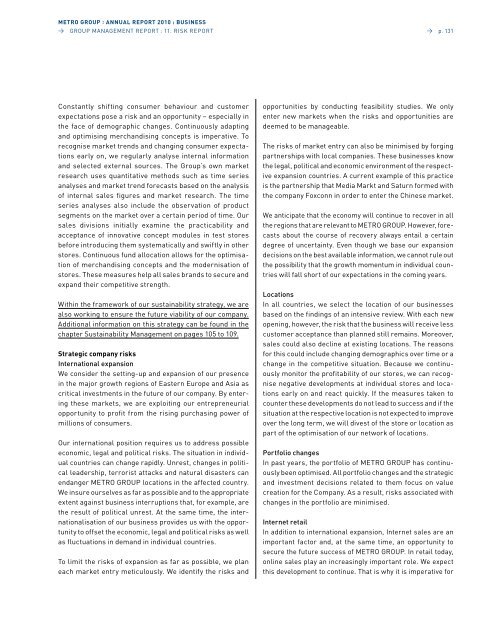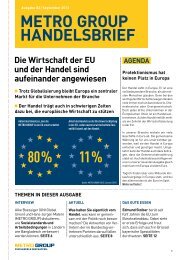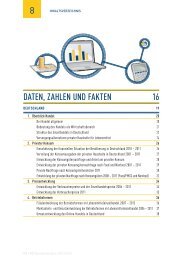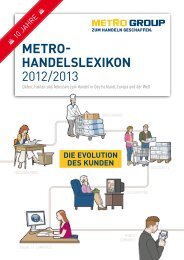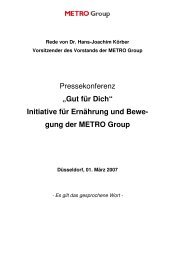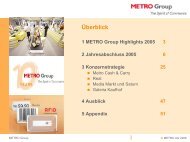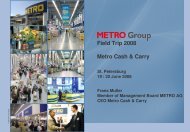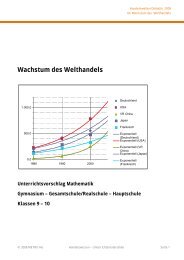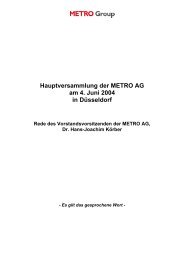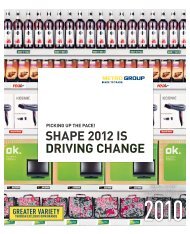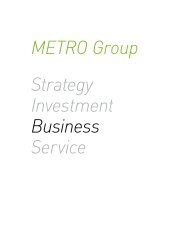pdf (2.5 MB) - METRO Group
pdf (2.5 MB) - METRO Group
pdf (2.5 MB) - METRO Group
Create successful ePaper yourself
Turn your PDF publications into a flip-book with our unique Google optimized e-Paper software.
<strong>METRO</strong> GROUP : ANNUAL REPORT 2010 : BUSINESS<br />
→ GROUP MANAGEMENT REPORT : 11. RISK REPORT<br />
Constantly shifting consumer behaviour and customer<br />
expectations pose a risk and an opportunity – especially in<br />
the face of demographic changes. Continuously adapting<br />
and optimising merchandising concepts is imperative. To<br />
recognise market trends and changing consumer expectations<br />
early on, we regularly analyse internal information<br />
and selected external sources. The <strong>Group</strong>’s own market<br />
research uses quantitative methods such as time series<br />
analyses and market trend forecasts based on the analysis<br />
of internal sales figures and market research. The time<br />
series analyses also include the observation of product<br />
segments on the market over a certain period of time. Our<br />
sales divisions initially examine the practicability and<br />
acceptance of innovative concept modules in test stores<br />
before introducing them systematically and swiftly in other<br />
stores. Continuous fund allocation allows for the optimisation<br />
of merchandising concepts and the modernisation of<br />
stores. These measures help all sales brands to secure and<br />
expand their competitive strength.<br />
within the framework of our sustainability strategy, we are<br />
also working to ensure the future viability of our company.<br />
Additional information on this strategy can be found in the<br />
chapter Sustainability Management on pages 105 to 109.<br />
Strategic company risks<br />
International expansion<br />
we consider the setting-up and expansion of our presence<br />
in the major growth regions of Eastern Europe and Asia as<br />
critical investments in the future of our company. By entering<br />
these markets, we are exploiting our entrepreneurial<br />
opportunity to profit from the rising purchasing power of<br />
millions of consumers.<br />
Our international position requires us to address possible<br />
economic, legal and political risks. The situation in individual<br />
countries can change rapidly. Unrest, changes in political<br />
leadership, terrorist attacks and natural disasters can<br />
endanger <strong>METRO</strong> GROUP locations in the affected country.<br />
we insure ourselves as far as possible and to the appropriate<br />
extent against business interruptions that, for example, are<br />
the result of political unrest. At the same time, the internationalisation<br />
of our business provides us with the opportunity<br />
to offset the economic, legal and political risks as well<br />
as fluctuations in demand in individual countries.<br />
To limit the risks of expansion as far as possible, we plan<br />
each market entry meticulously. we identify the risks and<br />
→ p. 131<br />
opportunities by conducting feasibility studies. we only<br />
enter new markets when the risks and opportunities are<br />
deemed to be manageable.<br />
The risks of market entry can also be minimised by forging<br />
partnerships with local companies. These businesses know<br />
the legal, political and economic environment of the respective<br />
expansion countries. A current example of this practice<br />
is the partnership that Media Markt and Saturn formed with<br />
the company Foxconn in order to enter the Chinese market.<br />
we anticipate that the economy will continue to recover in all<br />
the regions that are relevant to <strong>METRO</strong> GROUP. however, forecasts<br />
about the course of recovery always entail a certain<br />
degree of uncertainty. Even though we base our expansion<br />
decisions on the best available information, we cannot rule out<br />
the possibility that the growth momentum in individual countries<br />
will fall short of our expectations in the coming years.<br />
Locations<br />
In all countries, we select the location of our businesses<br />
based on the findings of an intensive review. with each new<br />
opening, however, the risk that the business will receive less<br />
customer acceptance than planned still remains. Moreover,<br />
sales could also decline at existing locations. The reasons<br />
for this could include changing demographics over time or a<br />
change in the competitive situation. Because we continuously<br />
monitor the profitability of our stores, we can recognise<br />
negative developments at individual stores and locations<br />
early on and react quickly. If the measures taken to<br />
counter these developments do not lead to success and if the<br />
situation at the respective location is not expected to improve<br />
over the long term, we will divest of the store or location as<br />
part of the optimisation of our network of locations.<br />
Portfolio changes<br />
In past years, the portfolio of <strong>METRO</strong> GROUP has continuously<br />
been optimised. All portfolio changes and the strategic<br />
and investment decisions related to them focus on value<br />
creation for the Company. As a result, risks associated with<br />
changes in the portfolio are minimised.<br />
Internet retail<br />
In addition to international expansion, Internet sales are an<br />
important factor and, at the same time, an opportunity to<br />
secure the future success of <strong>METRO</strong> GROUP. In retail today,<br />
online sales play an increasingly important role. we expect<br />
this development to continue. That is why it is imperative for


